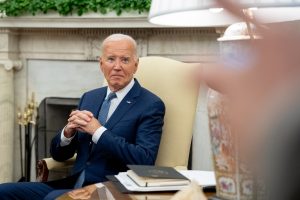
Millard: POTUS candidates silent on America’s debt
America’s national debt hit a record $35 trillion last week. With no end in sight to deficit spending, economists warn that a fiscal crisis could be approaching. So, why aren’t Vice President Kamala Harris or former president Donald Trump talking about it?
This year’s projected $1.9 trillion deficit is the largest on record outside of a national emergency like World War II, the Great Recession and the COVID pandemic. To put that in perspective, in 2001, when George W. Bush was president, total federal spending was $1.9 trillion. Federal debt was $5.8 trillion.
“It’s crazy, Congress and the administration are just absolutely unconcerned about the debt,” said Veronique de Rugy, an economist with Mercatus Center at George Mason University.
The government’s spending addiction is well-known. But it exploded during the Biden administration to more than $25 trillion in almost four years. During the eight-year Obama administration, it was $29 trillion.
The White House and Congress fought hard before the 2022 midterms to make pandemic-era spending levels the norm. They also passed laws like the American Rescue Plan, the infrastructure spending package, the CHIPs Act, and the Inflation Reduction Act.
That supercharged balance sheets, de Rugy said, because the government didn’t pay for the new programs with off-setting spending cuts or tax hikes. The deficit spending exacerbated inflation, increasing prices at the grocery store and the gas station. An incensed de Rugy said, “They are just piling on debt and accumulating spending for future generations to pay.”
Programs like Social Security and Medicare are the most significant drivers of spending. CBO economists say the two programs cost taxpayers $6.9 trillion this year and a projected $10.3 trillion by 2034. What’s worse, the programs are almost out of money.
Entitlement reform is a necessary step to avoid a fiscal crisis, according to the Committee for a Responsible Federal Budget. The bipartisan group wants debate moderators to press likely Democratic presidential nominee Harris and Republican nominee Trump on what they’d do to get control of the debt. More important, says committee president Maya MacGuineas, voters shouldn’t be satisfied “without specific answers.”
But that’s easier said than done.
A bipartisan group of 20 lawmakers sent House leadership a letter in early July arguing the country needs to change course to become financially solvent.
The letter presented no solutions, and the lawmakers acknowledged they disagreed on how to fix the debt. Of the lawmakers who signed the letter, seven voted for the American Rescue Plan Act and eight voted for the Inflation Reduction Act. Thirteen voted for the CHIPS Act and seven voted for the infrastructure bill.
MacGuineas said the time for Congress and the White House to do their jobs is now.
“Pay for your new spending; pay for your new or extended tax cuts; make deals, shake hands, pass budgets. In a word: govern.”
Taylor Millard writes about politics and public policy for InsideSources.com.


